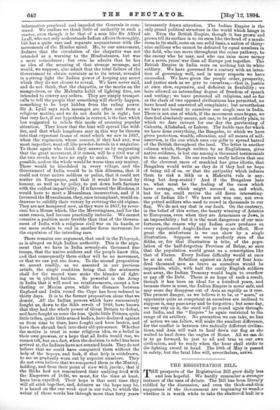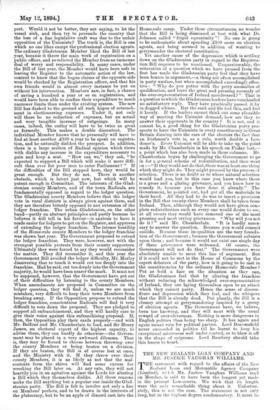THE REGISTRATION BILL. T HE prospects of the Registration Bill grow
daily less and less hopeful. We hardly remember a stronger instance of the uses of debate. The Bill has been literally riddled by the discussion, and, even the thick-and-thin supporters of the Government are beginning to wonder whether it is worth while to take the shattered hull into port. Would it not be better, they are saying, to let the vessel sink, and then try to persuade the country that the loss of a fine legislative craft was due to the unfair opposition of the Unionists ? The truth is, the Bill is one which no one likes except the professional election agents. The ordinary Gladstonian Member liked the Bill of last year, because it threw the main work of registration on a public officer, and so relieved the Member from an immense deal of worry and responsibility. In many cases, under the Bill of last year, the Member would have been safe in leaving the Register to the automatic action of the law, content to know that the bogus claims of the opposite side would be checked by the Registration officer, and that his own friends would in almost every instance be put on without his intervention. Members saw, in fact, a chance of saving a hundred a year or so on registration, and would have been able to confine their expenditure to much narrower limits than under the existing system. The new Bill has dashed to the ground all such hopes of retrench- ment in electioneering expenses. Under it, not only will there be no reduction of expenses, but an actual and very tangible increase of outgoings. In many cases, indeed, the outlay will have to be twice as great as formerly. This makes a double discontent. The individual Member knows that he personally will have to find at least another £100 a year to be spent on registra- tion, and he naturally dislikes the prospect. In addition, there is a large section of Radical opinion which views with dislike any increase in the expenditure necessary to gain and keep a seat. "How can we," they ask, "be expected to support a Bill which will make it more diffi- cult than ever for poor men to enter Parliament ? " If the difficulties of the Bill stopped here, they would be great enough. But they do not. There is another obstacle, which is latent just now, but which will be patent enough in Committee. The interests of the Glad- stonian county Members, and of the town Radicals, are fundamentally opposed in regard to the lodger question. The Gladstonian county Members believe that the lodger vote in rural districts is always given against them, and they are therefore bitterly opposed to any extension of the lodger franchise. The urban Gladstonian, on the other hand—partly on abstract principles and partly because he believes it will tell in his favour—is anxious to have it made easier for lodgers to get on the Register, and approves of extending the lodger franchise. The intense hostility of the Home-rule county Members to the lodger franchise was shown last year. The Government proposed to extend the lodger franchise. They were, however, met with the strongest possible protests from their county supporters. Ultimately they were forced to say they would reconsider the matter. They did reconsider it, and this year the Government Bill avoided the lodger difficulty, Mr. Morley discovering that to touch it would cut too deeply into the franchise. Had he said, cut too deeply into the Government majority, he would have been nearer the mark. It must not be supposed, however, that the Government have got out of their difficulties by listening to the county Members. When amendments are proposed in Committee on the lodger question, they will find it, unless we are much mistaken, very difficult to keep their town Members from breaking away. If the Opposition propose to extend the lodger franchise, conscientious Radicals will find it very difficult to vote down the proposal. They are pledged to support all enfranchisement, and they will hardly care to give their votes against this enfranchising proposal. If, then, the Opposition play their cards properly—and with Mr. Balfour and Mr. Chamberlain to lead, and Sir Henry James, an electoral expert of the highest capacity, to advise them, they can hardly do otherwise—the Govern- ment may be placed in a very awkward dilemma. That is, they may be forced to choose between throwing over the county Members or being beaten on a division. If they are beaten, the Bill is of course lost at once, and the Ministry with it. If they throw over their county Members, it is as likely as not that the mal- contents from the shires will find some excuse for wrecking the Bill later on. At any rate, they will not heartily join in an agitation against the Lords for altering a Bill which they themselves dislike. All these reasons make the Bill anything but a popular one inside the Glad- stonian party. The Bill is felt to involve not only a fine on Members' pockets, and to be drawn in the interests of the plutocracy, but to be an apple of discord cast into the Home-rule camp. -Under these circumstances, no wonder that the Bill is being dismissed at best with what Dr. Johnson called "frigid equanimity " ! No one is going to be enthusiastic about spending £100 more on election agents, and being accused in addition of wanting to gerrymander the electoral constitution.
Yet another cause of the depression which is settling down on the Gladstonian party in regard to the Registra- tion Bill requires to be mentioned. Unquestionably, the reiteration of a question which we have pressed from the first has made the Gladstonian party feel that they have been beaten in argument,—a thing not often accomplished in party warfare, but when accomplished exceedingly effec- tive: "Why do you potter with the petty anomalies of qualification, and leave the great and pressing anomaly of the over-representation of Ireland unredressed ?" That is a question to which the Gladstonian leaders have vouchsafed no satisfactory reply. They have practically passed it by in dogged silence. But the rank and file feel this, and feel it keenly. If the leaders cannot think out some plausible way of meeting the Unionist demand, how are they to answer their opponents in the country ? It is not, and it cannot be, a good thing for the Gladstonian party pro- spects to have the Unionists in every constituency in Great Britain dinning into the ears of the electors the fact that an Irishman's vote is, as a rule, worth double a Lon- doner's. Every Unionist will be able to take up the point made by Mr. Chamberlain in his speech on Friday last,— a point which has also been made in these columns. Mr. Chamberlain began by challenging the Government to go in for a general scheme of redistribution, and then went on :—" If they would not do that, there was at least one thing which they might do. They might proceed by the process of selection. There is no doubt as to where natural selection would lead you, but in this case you know where there is a gross and a glaring grievance, and you know how to remedy it, because you have done it already." The Government, he pointed out, had got all the materials to their hand. All they had to do was to insert a provision in the Bill that twenty-three Members shall be taken from Ireland. Then, although they would not have given com- plete redistribution such as every one would desire to see, at all events they would have removed one of the most pressing and most crying grievances. "Why will you not do it ? " said Mr. Chamberlain. "It is hardly neces- sary to answer the question. Because you would commit suicide. Because these inequalities are the very founda- tion of the Government ; because the Government subsists upon them ; and because it would not exist one single day if these grievances were redressed. Of course, the Government will not do that." The Government were absolutely unable to meet this line of argument. But if it could not be met in the House of Commons by the expert debaters of the party, how is it going to be met in the constituencies by the ordinary Home-rule Member ? Put as bold a face on the situation as they can, the Gladstonians feel that by altering the franchise without reducing the acknowledged over-representation of Ireland, they are laying themselves open to an attack which they cannot parry. Hence the sense of discom- fiture and depression which they feel, and the whispers that the Bill is already dead. Put plainly, the Bill is a clumsy attempt at gerrymandering inspired by a group of election agents. The Government have, we believe, been too knowing, and they will meet with the usual reward of over-cleverness. Nothing is more dangerous in English politics than being too sharp. It has again and again meant ruin for political parties. Lord Beaconsfield never succeeded in politics till he learnt to keep his exceptional astuteness well under control, or to blow it off in the shape of epigrams. Lord Rosebery should take this lesson to heart.



































 Previous page
Previous page